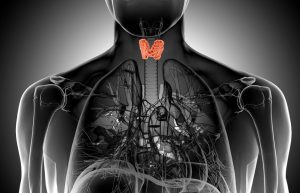
The thyroid sits just below your larynx near the base of your neck. This approximately 2-inch-long gland is part of your endocrine system and controls your metabolism. The health of your thyroid can affect many components in your body, such as how deep you breathe, how fast your heart beats, and whether you lose or gain weight. The thyroid also helps control your body’s cholesterol levels, temperature, and menstrual cycles in women.
January is Thyroid Awareness Month and to celebrate this special cause, the Vancouver Thyroid Centre (a division of Vitalia Health Care), would like to lend its support. Thyroid Awareness Month is recognized by the Blue Paisley Ribbon campaign and the American Association of Clinical Endocrinologists. An estimated 5 to 10 percent of the North American population is believed to have some degree of thyroid disease or dysfunction, many cases still undiagnosed.
Thyroid Assessments and Your Health
The thyroid creates hormones as needed by the body. In some instances, the body may require more thyroid hormones, and in others, fewer. To produce an optimal amount of hormones, the thyroid gland may require help from the pituitary gland which instructs the thyroid to either release more or fewer hormones into the bloodstream. When extra hormones are needed, the body releases T3 and T4 from blood proteins.
Hypothyroidism can present with vague symptoms, such as weight gain, difficulty losing weight, low libido, fatigue, low energy, depression, constipation, dry skin, joint pain, foggy brain, slow reflexes, swelling, irregular periods, hives, and feeling cold all the time. These symptoms can worsen during periods of stress and are often confused with other conditions.
Physical examination and regular screening of the thyroid gland are important parts of healthcare. Thyroid disease can be diagnosed via a blood test. The screening test for thyroid stimulating hormone (TSH) can be used to show out-or-range thyroid results. Some consider this test to be insufficient and recommend a full comprehensive thyroid assessment to diagnose hypothyroidism.

At Vitalia, we perform full thyroid assessments that include the active thyroid hormones T3 and T4, important auto-immune thyroid markers that can help us determine if the body cells are receiving adequate active thyroid hormones. The analysis of both thyroid hormones and antibodies can often improve the accuracy of a diagnosis and the success of treatments.
Your thyroid is critical to your overall health and when there is an imbalance, it can affect many other components of your well-being. When you come to Vitalia for a thyroid evaluation and assessment, we will ask you questions about your baseline health, lifestyle, and symptoms you may be experiencing. We may then recommend a thyroid test to evaluate your hormone levels.
Testing for Thyroid Problems at Vitalia
Some people experience hypothyroid symptoms but are told they do not have a thyroid condition as their TSH values fall within the reference range. In these cases, we suggest a more comprehensive thyroid evaluation.
At Vitalia Health Care in Vancouver, we begin with testing 6 markers of thyroid functioning through a blood test. These markers include TSH, free T4, free T3, Thyroperoxidase, and Thyroglobulin antibodies, as well as reverse T3. This comprehensive laboratory testing takes a more in-depth analysis of how well your thyroid gland is working and how well your cells are responding to your thyroid hormones.
To learn more about our thyroid tests or to schedule a consultation with a naturopathic doctor, contact Vitalia Health Care.
Dr Tasreen Alibhai, ND



